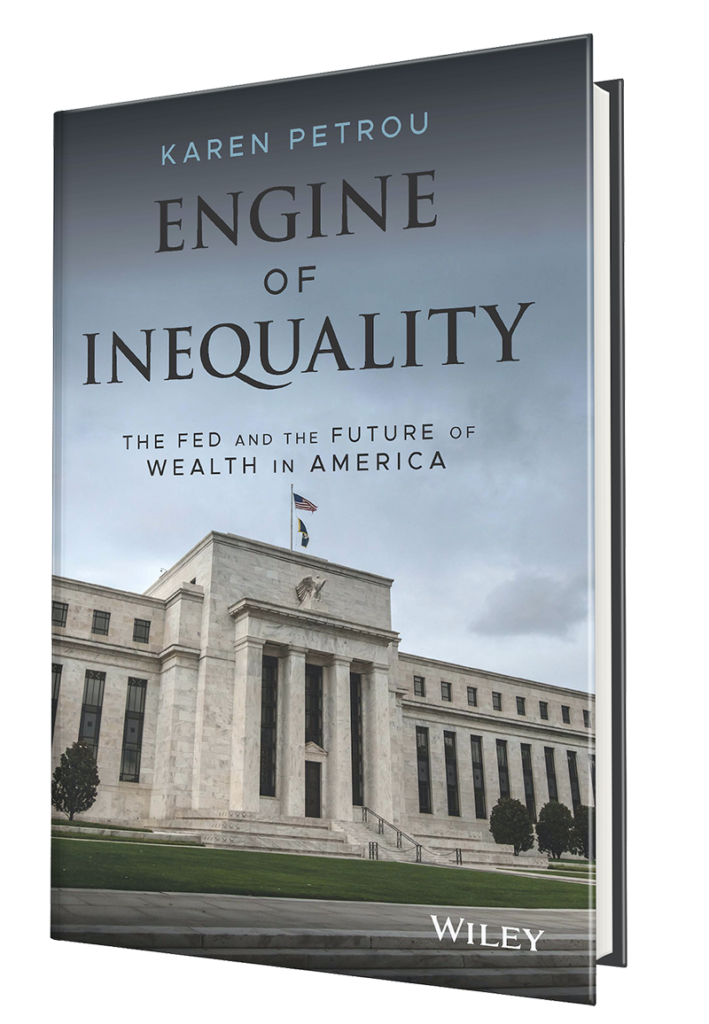Our Services
Engine of Inequality, by Karen Petrou
The first book to reveal how the Federal Reserve holds the key to making us more economically equal, written by an author with unparalleled expertise in the real world of financial policy.
Following the 2008 financial crisis, the Federal Reserve’s monetary policy placed much greater focus on stabilizing the market than on helping struggling Americans. As a result, the richest Americans got a lot richer while the middle class shrank and economic and wealth inequality skyrocketed. In Engine of Inequality, Karen Petrou offers pragmatic solutions for creating more inclusive monetary policy and equality-enhancing financial regulation as quickly and painlessly as possible.
“Petrou’s book uncovers a hidden engine of our skyrocketing inequality: financial-policy. In an accessible and engaging prose, Petrou takes us through the inner workings of monetary policy at the Fed and financial regulations, how they’ve made inequality worse and how they could instead be retooled to take us to a more equitable future. A novel look at the problem of inequality and bold ideas to help resolve it. A must read.”—Emmanuel Saez, Professor of Economics at the University of California Berkeley and author of The Triumph of Injustice
Read full description and reviews.
Industry Expert
Federal Financial Analytics (FedFin) is a Washington-based financial services-consulting firm that has for decades attracted a high-powered clientele in Washington, on Wall Street, and among global central bankers. Since 1985 FedFin has provided a unique blend of analysis and strategic advice on public policy, regulatory, and legislative issues for industry and governmental clients doing business in the U.S. and abroad.
A proprietary think-tank for its clients, FedFin reviews critical federal and global policy developments in banking, insurance, asset management, and mortgage finance, analyzes them in great depth, and then advises clients on whether what they want can be made to work for them, within the policy environment and for the financial system. It is FedFin’s guiding principle to be an honest broker, and clients depend on the fact that the firm does not offer lobbying or any other services that could compromise its objectivity and independence.
As seen In:
In the News
Semafor, Tuesday, January 27, 2026
Trump adviser Stephen Miran mired in Fed’s personnel purgatory By Eleanor Mueller Stephen Miran was supposed to step down from the Federal Reserve at the end of this week. That’s not going to happen. As Trump nears a decision on a central bank nominee who’d arrive as his chosen successor [...]
The New Republic, Tuesday, January 27, 2026
What Trumpian Chaos Is Doing to the Dollar One potential long-term casualty of continued political instability sown by the administration: America’s centrality to the international monetary system. By Grace Seger Natural gas futures charts on the floor of the New York Stock Exchange on January 20. Stocks, bonds and the [...]
Marketplace, Friday, January 23, 2026
Ford and GM get FDIC approval to open their own banks By Justin Ho The Federal Deposit Insurance Corporation recently announced that it accepted applications to set up deposit insurance for new banks created by automakers Ford and GM. Ford Credit Bank and GM Financial Bank are planning to start offering [...]
Issues in Focus
The Vault
Karen Petrou: Why the Fed’s New-Found Neglect of Banks is Not Benign
Clients will today receive our in-depth analysis of the Fed’s proposal to radically realign access to the nation’s payment system. As we make clear, the Fed is eyeing a change many banks fear will put them at an acute competitive disadvantage. Ordinarily, this would slow the central bank. Now, not a bit, a sea-change from longstanding Fed thinking. If it lasts, banking will never be the same. Is that all [...]
Karen Petrou: Why Big-Bank Compensation is No Longer Impregnable
I and many others have noted over the years that populists and progressives often advocate the same economic policies no matter how much they otherwise wage culture wars. A little-noticed case in point is work underway in the Trump White House to subject the biggest defense contractors to strict limits on compensation and capital distributions. Treasury Secretary Bessent is said to support the idea, leading Sen. Warren to suggest a [...]
Karen Petrou: Policy Now Demands that Bankers Back Pornographers – What could Go Wrong?
As we noted, the OCC last week loosed an anti-debanking fusillade at nine of the nation’s biggest banks. Among other things, the agency sanctions banks for deciding on customers based on “values” and for evaluating relationships affected by negative press coverage. The OCC demands that key business sectors be served without scruple even if, as with “adult entertainment,” there may be good reasons to demur. Some “adult entertainment” may be [...]





